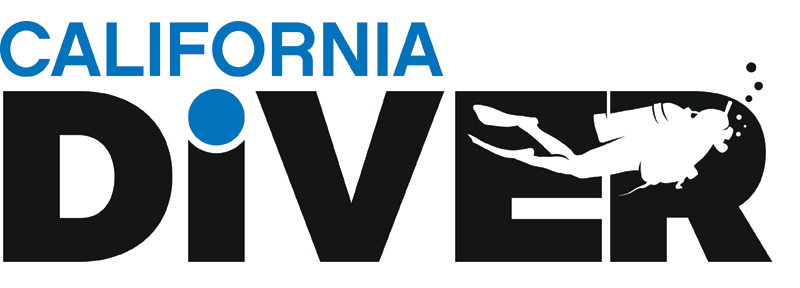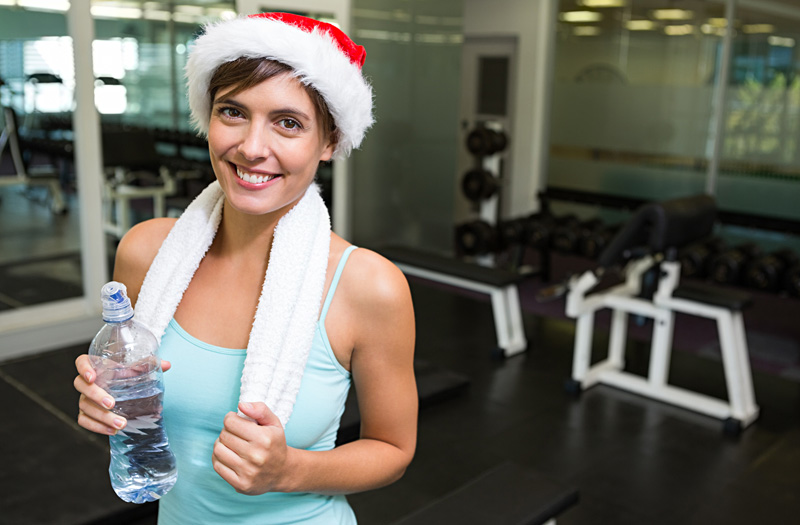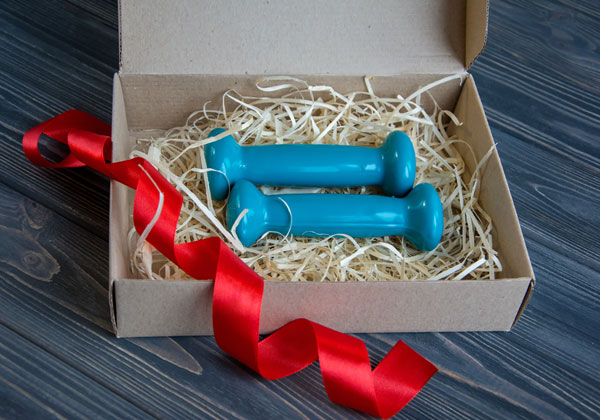The holidays seem to pop up on the calendar sooner each year. Not only that, they blend together lasting from October through January. This favorite time of year challenges almost every aspect of overall wellness. Often, there is simply not enough time to get everything done. One of the first things to fall out of the schedule is the daily workout. Exercise is the great equalizer. Without regular workouts divers eliminate a mechanism of stress reduction during a very stressful time pushing mental, emotional and physical wellbeing to unhealthy limits. Nutrition changes with skipped meals and special events, leaving little self-control for all the holiday food.
Start fresh daily: Recommit to exercise and nutrition daily by reviewing goals. Focusing on fitness and nutrition one-day-at-a-time works especially well during the holidays.
Make time to exercise every day: Allow ample time in the schedule for workouts even if they are short exercise sessions. Don’t intentionally get too busy. If necessary, make an appointment to exercise. As a last option, modifying the workout schedule with purpose to ensure longer workout sessions (i.e., continue at least three days each week instead of the usual four).
Prioritize aerobic exercise: Cardiorespiratory fitness is the highest priority for divers. Recent studies indicate exercising at a comfortable pace for as little as 45 minutes counteracts the negative effects of a high fat meal and actually improves artery function. Further, when exercise is combined with low fat meals, artery function is improved beyond what is was before the meal for a net positive healthy result.
Maintain and improve current fitness accomplishments: The New Year will arrive soon enough and divers will still have plenty of demands on time. Making up for two months of neglecting a fitness plan will take at least an equivalent amount of time (i.e., eight weeks). Staying on track now puts divers ahead rather behind when it’s time to set goals for the new year.
Look ahead: Setting short-term goals now creates success for long-term goals after the holidays. As soon as the clock strikes the New Year, target goals transition from daily to weekly. Be specific about goals and set a date for completion.
Best is best: Walk, run or bike further and faster. Use training progressions to work toward lifting more weight each week.
Think before indulging: Holiday parties are not an excuse to dive in with abandon. Even one high fat meal can cause dramatic increases in blood pressure and increase cardiorespiratory stress associated with both physical and mental tasks, which contribute to heart disease over time. The caloric content of a traditional holiday meal is estimated between 3,000 and 7,000 calories. The resulting high blood lipid levels, high blood sugar levels, and high blood alcohol content may take from three to 10 hours for the body to metabolize. Give the body time to metabolize any over-indulgences before diving.
Avoid eating high fat and high sugar foods at the same time: Even when eating below daily caloric needs, the stress of this combination on the body leads to high blood pressure, diabetes, heart disease and obesity. Considering these are the most frequently reported medical conditions by divers, think before eating, especially during the holidays.
Choose smaller portions: Reduce portions to one-fourth cup (about the size of the screen of a dive computer). This small portion of mashed potatoes, stuffing, yams, rolls, butter, turkey, ham, gravy, green beans and cranberry are three cups of food. Most portions are easily double or triple this size in addition to alcoholic beverages and desserts.
Don’t overeat: Most Americans overeat every day and during the holidays are likely to gain an average of a pound per week. This weight gain is often around the waist, hips and buttocks distorting efficient contours for streamlined movement, increasing drag and requiring more effort by the diver. Studies have also shown greater potential for more vertical and dangerous ascent rates with larger buoyancy compensation devices, more likely to be worn by a larger diver. Higher body fat percentages are also considered a factor for higher risk of decompression sickness.
Eat in increments: Schedule small meals every two to three hours in proportion to activity level. Divers sitting at a desk for the next three hours will obviously burn fewer calories and require less nutrition to fuel the activity than divers who are lifting weights or going for a walk during this same time.
Plan for parties: On party days, low-calorie meal replacement shakes are a great option allowing divers to reserve a few extra calories for the special event. This doesn’t mean when arriving at the party divers can eat bust-a-gut on unhealthy foods. However, the overall daily consumption of calories will hopefully be reduced from what might have been consumed with full meals throughout the day.
Exercise before going to a party: Following the pre-party workout, drink a high quality protein drink to replenish the body and satisfy the appetite. Make decisions about what to eat and what not to eat before going to dinner. Divers may have an entrée choice in advance, like many company events. Choose the plate that most fits the nutrition plan and request more vegetables in lieu of potatoes. Many events begin with beverages and appetizers. Always eat a bite of protein before sipping an alcoholic beverage. Club Soda, iced tea and just plain water are also great options. Be selective. Don’t eat something just because it’s only around once a year.
Eat, prepare and bring healthy food: Switching from saturated butter and fats to unsaturated oils is a significant improvement toward a healthy lifestyle. Saturated fats will decrease HDL (good) cholesterol while unsaturated fats actually may increase HDL (good) cholesterol. There are many “cooking light” recipes for traditional holiday dishes. If the meal is potluck, prepare and bring a healthy dish. Fresh green salads, wild and brown rice, steamed vegetables and fruit salads are all healthy options. Spend no more than one dive (about an hour) eating your main meal and take a surface interval (of several hours) before dessert. Select one dessert. Avoid snacking during the hours between. If you must, eat from the veggie tray (avoid the cream cheese dips – try the salsa).
Enjoy foods in sequence: Eat a protein food first before eating carbohydrates. Protein is a low-glycemic food source that gives carbs a place to land and allows the body to digest food slowly helping to prevent many of the metabolic processes that lead to stored fat. Proteins usually contain some amount of fat, which is also more satisfying so divers may be likely to eat less. For example, if the party begins with cocktails, be sure to have a protein-based hors d’oeuvre with the first sip.
Plan and prepare daily meals in advance: Make healthy entrees in advance to carry for lunch and for easy dinners at the end of the day. Freeze the entrees for later use. Most food items will last for up to 30 days in the freezer. It takes about two-to-four hours to prepare two-to-four weeks of meals.
Setup social support: Find a friend or family member or dive buddy for fitness activities. Join a group exercise class or participate in a pre-planned meal and support program. Spend time with others who have similar health and fitness goals or decide in advance as a family or group of friends to practice healthy holiday habits.
Track progress in a journal: Don’t step on the scale every day, but instead select the same day each week to check body weight. Once a month, on the same day each month, measure body composition and take measurements. Track goals, workouts, meals, measurements and results in a daily journal. It is a great feeling to go back and review the progress.
With awareness and advanced planning divers can continue to improve and celebrate better health during the holidays and get a fresh start on the New Year.
——–
Story by Gretchen Ashton
Gretchen M. Ashton, CFT, SFT, SFN, NBFE, is registered with the National Board of Fitness Examiners, and is an International Sports Sciences Association Elite Trainer; personal trainer, specialist in fitness therapy, specialist in fitness nutrition, and a world champion athlete. Gretchen is founder of ScubaFit LLC, developed the Comprehensive FitDiver®program, is an advanced scuba diver, nitrox diver, and co-author of the ScubaFit® Diver Course. She is an Expert Speaker for Los Angeles County Scuba Advanced Diver Program and Underwater Instructor Certification Course.
.


